If you’re considering investing your money, Vanguard is one option that may come to mind.
With its reputation for low-cost, high-quality investments, Vanguard is a popular choice among investors.
But is Vanguard worth it? The answer depends on your investment goals, risk tolerance, and financial situation.
One of the biggest advantages of investing with Vanguard is its low fees. With a focus on low-cost index funds and ETFs, Vanguard offers some of the lowest expense ratios in the industry.
This can be a significant advantage for long-term investors, as fees can eat into your returns over time.
Additionally, Vanguard offers a wide range of investment options, including mutual funds, stocks, and bonds, giving you the ability to diversify your portfolio and tailor your investments to your specific needs.
However, it’s important to note that not all investments are created equal, and there are still fees associated with investing with Vanguard.
Additionally, while Vanguard offers a wealth of research and educational resources, it’s ultimately up to you to do your due diligence and make informed investment decisions.
Overall, whether or not Vanguard is worth it for you depends on your individual investment goals and needs.
Post Contents
What is Vanguard?

If you are interested in investing, you have probably heard of Vanguard.
Vanguard is one of the largest investment management companies in the world, with over $7 trillion in assets under management.
It was founded in 1975 by John C. Bogle, who is widely regarded as the father of index investing.
Vanguard’s History
Vanguard has a fascinating history that is closely tied to the development of index funds. John C. Bogle, who was the founder of Vanguard, was a strong advocate of passive investing.
He believed that most active fund managers could not consistently outperform the market, and that investors would be better off investing in low-cost index funds.
In 1976, Vanguard launched the first-ever index mutual fund, the Vanguard 500 Index Fund.
This fund was designed to track the performance of the S&P 500 index, which is a benchmark for the U.S. stock market.
The fund was an immediate success, and it helped to pave the way for the development of other index funds.
Vanguard’s Philosophy
Vanguard’s philosophy is based on the idea of low-cost, passive investing.
The company believes that most investors would be better off investing in low-cost index funds, rather than trying to pick individual stocks or actively managed funds.
One of the key advantages of passive investing is that it tends to be less expensive than active investing.
Active fund managers often charge high fees, which can eat into your returns over time.
In contrast, index funds tend to have lower fees, which means that more of your money stays invested in the market.
Another advantage of passive investing is that it tends to be less risky than active investing.
Active fund managers often take on more risk in an attempt to beat the market, which can lead to higher volatility and larger losses.
In contrast, index funds are designed to track the performance of the market, which means that they tend to be less risky over the long term.
Overall, Vanguard is a company that is committed to helping investors achieve their financial goals through low-cost, passive investing.
If you are interested in investing, Vanguard is definitely worth considering.
Vanguard Investment Products
When it comes to investment products, Vanguard offers a wide range of options to suit different needs and preferences.
Here are some of the most popular ones:
Vanguard Mutual Funds
Vanguard is widely known for its low-cost mutual funds, which are a great option for long-term investors who want to build a diversified portfolio.
With over 100 mutual funds to choose from, you can find funds that invest in stocks, bonds, real estate, and more.
The average expense ratio for Vanguard mutual funds is 0.09%, which is significantly lower than the industry average.
Vanguard ETFs
If you prefer to invest in exchange-traded funds (ETFs), Vanguard also offers a variety of options.
Like their mutual funds, Vanguard’s ETFs are known for their low expense ratios and long-term investment focus.
With over 70 ETFs to choose from, you can find funds that invest in domestic and international stocks, bonds, and commodities.
Vanguard Digital Advisor
For those who prefer a more hands-off approach to investing, Vanguard offers a robo-advisor service called Vanguard Digital Advisor.
This service uses algorithms to create and manage a personalized investment portfolio for you, based on your goals, risk tolerance, and time horizon.
The minimum investment for Vanguard Digital Advisor is $3,000, and the annual advisory fee is 0.15%.
Vanguard Personal Advisor Services
If you prefer a more personalized approach to investing, Vanguard also offers a human-based advisory service called Vanguard Personal Advisor Services.
With this service, you’ll work with a dedicated advisor who will create and manage a customized investment plan for you.
The minimum investment for Vanguard Personal Advisor Services is $50,000, and the annual advisory fee is 0.30%.
529 College Savings Plan
For parents and grandparents who want to save for their children’s or grandchildren’s education, Vanguard offers a 529 college savings plan.
This plan allows you to invest in a tax-advantaged account that can be used to pay for qualified education expenses, such as tuition, room and board, and textbooks.
Vanguard’s 529 plan offers a variety of investment options, including age-based portfolios and individual portfolios.
Overall, Vanguard offers a variety of investment products to suit different needs and preferences.
Whether you prefer mutual funds, ETFs, robo-advisors, or human advisors, Vanguard has something for you.
With low expense ratios and a long-term investment focus, Vanguard is definitely worth considering for your investment portfolio.
Vanguard Fees and Expenses
When considering investing with Vanguard, it’s important to understand the fees and expenses associated with their investment products.
Here’s a breakdown of some of the key fees you might encounter.
Expense Ratios
One of the biggest advantages of investing with Vanguard is their low expense ratios.
In fact, Vanguard’s average expense ratio is 0.09%, which is significantly less expensive than the industry average.
This means that you can keep more of your investment returns and pay less in fees over the long term.
Trading Commissions
Vanguard charges a $1 fee per contract for options trades, which is relatively high compared to some other online brokers.
However, if you have more than $1 million in assets under management (AUM) with Vanguard, you can qualify for waived broker-assisted fees.
Account Service Fees
Vanguard does charge some account service fees, but they are generally low and can be avoided in some cases.
For example, there is a $20 annual account fee for brokerage accounts, but this fee is waived if you sign up for electronic delivery of statements and other documents.
Similarly, there is a $20 annual account fee for IRA accounts, but this fee is waived if you have at least $50,000 in Vanguard mutual funds and ETFs.
Investment Minimums
One of the advantages of investing with Vanguard is their low investment minimums.
Most Vanguard mutual funds require a minimum investment of just $1,000, while many Vanguard ETFs can be purchased for the cost of a single share.
However, some funds do have higher minimums, so it’s important to check the requirements before investing.
Overall, Vanguard’s fees and expenses are generally lower than those of many other investment firms.
This can help you keep more of your investment returns and achieve your long-term financial goals.
Vanguard Account Options
When it comes to investing with Vanguard, there are several account options available to you.
In this section, we’ll go over the different account types, including retirement accounts, margin accounts, and fractional shares.
Account Types
Vanguard offers several account types to meet your investment needs, including individual brokerage accounts, joint brokerage accounts, trust accounts, and more.
Each account type has its own set of features and benefits, so it’s important to choose the one that best fits your investment goals.
Retirement Accounts
Retirement planning is a crucial part of any investment strategy, and Vanguard offers several retirement accounts to help you save for your golden years.
These include traditional and Roth IRAs, SEP-IRAs, and SIMPLE IRAs.
Each account has its own contribution limits and tax benefits, so it’s important to understand the differences before choosing one.
Margin Accounts
If you’re looking to take on more risk and potentially earn higher returns, a margin account might be the right choice for you.
With a margin account, you can borrow money from Vanguard to invest in securities, potentially increasing your buying power and returns.
However, it’s important to remember that margin trading comes with its own set of risks and should only be done by experienced investors.
Fractional Shares
Vanguard also offers fractional shares, which allow you to invest in stocks and ETFs with as little as $1.
This can be a great option for investors who want to diversify their portfolio but don’t have a lot of money to invest upfront.
Overall, Vanguard offers a wide range of account options to meet your investment needs.
Whether you’re planning for retirement or looking to take on more risk, Vanguard has an account type that can help you achieve your goals.
Vanguard Trading Platform
When it comes to investing with Vanguard, one of the most important aspects to consider is the trading platform.
Here’s what you need to know about Vanguard’s trading platform.
Trading Platform Features
Vanguard’s trading platform is designed for the passive buy-and-hold investor with simple requirements. The focus is on balance, holdings, and transactions.
The platform is basic and lacks the analytical and educational tools typically offered by brokers that support stock trading. However, it’s easy to use and navigate.
The platform offers the following features:
- Free stock and ETF trading
- No inactivity or account fees
- Easy and fully digital account opening process
- User-friendly mobile trading platform with a great design
Investment Research
Vanguard offers investment research tools that are quite basic. The platform provides access to market news and information, but it lacks the in-depth analysis and tools offered by other brokers.
If you’re looking for advanced research tools, you may want to consider other brokers.
Screener
Vanguard’s screener is a simple tool that allows you to filter mutual funds and ETFs based on various criteria.
You can filter funds by asset class, expense ratio, minimum investment, and more. However, the screener is not as robust as other screeners offered by other brokers.
Overall, Vanguard’s trading platform is a good option for slow-and-steady, buy-and-hold investing.
The platform has quirks that set it apart from many competitors, but it may not be the best fit for everyone.
If you’re a more active trader or looking for advanced research tools, you may want to consider other brokers.
Vanguard Customer Support
When it comes to investing, having access to reliable customer support can make all the difference.
Vanguard offers a variety of customer support options to help you with any questions or concerns you may have about your investments.
Customer Service
Vanguard’s customer service team is available to assist you with any account-related questions or issues you may have.
You can reach them by phone, email, or through their online messaging system.
Their customer service team is available Monday through Friday from 8:00 a.m. to 8:00 p.m. Eastern Time.
Guidance
Vanguard also offers guidance to help you make informed investment decisions. Their website provides a wealth of information on investing, including articles, videos, and webinars.
They also offer a variety of tools and calculators to help you plan for retirement, estimate your investment returns, and more.
Financial Advisors
If you’re looking for more personalized guidance, Vanguard offers access to financial advisors.
Their advisors can help you with a variety of investment-related topics, including retirement planning, tax planning, and estate planning.
Vanguard’s advisors are fee-only, meaning they do not earn commissions on the investments they recommend.
Overall, Vanguard’s customer support options are robust and can help you feel confident in your investment decisions.
With a variety of options to choose from, you can find the level of support that works best for you.
Is Vanguard Worth It?
If you’re considering investing with Vanguard, you may be wondering if it’s worth it. Here are some factors to consider.
Advantages of Investing with Vanguard
One advantage of investing with Vanguard is their investment philosophy. They believe in passive investing, which means they focus on creating a diversified portfolio of low-cost index funds and ETFs.
This approach has historically performed well over the long term, and it’s a good fit for buy-and-hold investors who are looking to minimize risk and volatility.
Another advantage is the wide range of investment products they offer.
Vanguard has a variety of index mutual funds, actively managed funds, and ETFs that cover a range of asset classes, including equities, bonds, and money market funds.
They also have options for socially responsible investing (ESG) and other specialized strategies.
Vanguard’s fees and expenses are generally low, which is another advantage for investors.
They offer commission-free trading on most of their investment products, and their managed accounts (Vanguard Advisor Services, or VAI) have low minimum requirements and expenses.
Disadvantages of Investing with Vanguard
One potential disadvantage of investing with Vanguard is that they may not be the best choice for active traders who want to make complex options trades.
They also have higher investment minimums for some of their Admiral Shares, which may be a barrier for some individual investors.
Another disadvantage is that Vanguard’s investment philosophy may not be a good fit for everyone.
Some investors may prefer active investing or more specialized strategies, and Vanguard’s focus on passive investing may not align with their goals.
Overall, whether or not Vanguard is worth it depends on your investment goals and preferences.
If you’re a long-term investor who values low-cost, diversified portfolios, Vanguard may be a good fit for you.
If you’re an active trader or prefer more specialized strategies, you may want to consider other investment firms.






























